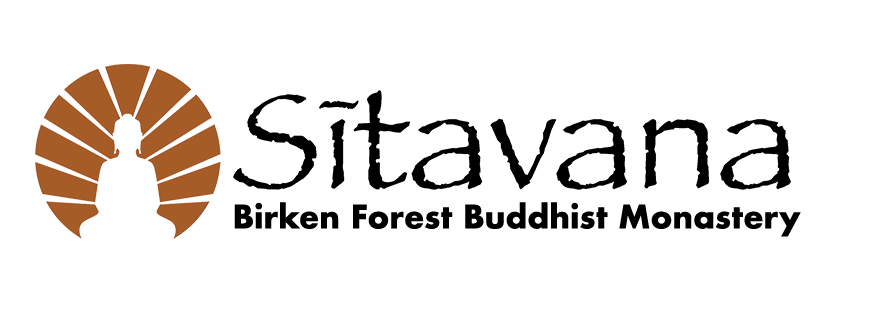Our Virtual Mindfulness Retreat
Has Ended…
…Your Practice Continues
We wish to express our deep gratitude to everyone who participated in our first online virtual retreat. Hundreds, if not thousands, of you joined us each day for meditation, chanting, teatimes and evening Dhamma talks. We invite you to continue to access many of these resources through Ajahn Sona’s YouTube Channel, podcasts, and audio downloads. You can find Ajahn Sona’s series of talks on Right Effort at this link. Watch for his Jhana talks in the coming months.
For those of you who wish to renew your commitment to both the retreat and your fellow retreatants, please visit and subscribe to the Pacific Hermitage YouTube Channel. From there you can join Ajahn Sudanto for his Morning Coffee Q&A chat, 8:00 a.m. PDT.
We leave you with the image above of our aspens in their verdant glory that was taken last year. As Ajahn Sona mentioned in our final teatime, it is a sight we look forward to witnessing each spring here at Birken. Ephemeral beauty in the palm of wise attention. A gift of mindfulness for us all.
In the midst of all that is the world, may you remain well, happy and peaceful.
Live Streaming Schedule (all times Pacific Daylight Time (PDT), subject to change):
(Dhamma talks and Teatimes will be available for viewing later as well at Ajahn Sona’s YouTube Channel)
May 1st:
8:15pm: Opening Dhamma Talk with Ajahn Sona
May 2nd-9th:
5:30am: * Morning Chanting & Meditation
4:00pm: Teatime with Ajahn Sudanto
7:00pm: * Evening Chanting & Meditation
8:15pm: Dhamma Talk with Ajahn Sona
May 10th:
5:30am: * Morning Chanting & Meditation
4:00pm: Teatime with Ajahn Sona
7:00pm: * Evening Chanting & Meditation
*Morning and evening chants may be found here and are indicated with red squares. Ajahn Sona’s excerpt of The Four Foundations of Mindfulness can be found in the Birken Chanting book, page 6-7. The entire Birken Chanting Book may be found here.
Pali-English Chanting Tutorial with Ajahn Sudanto can be found on the Virtual Mindfulness Retreat playlist at Ajahn Sona’s YouTube Channel
Sample Daily Retreat Schedule
Below are some suggestions on how you may wish to approach the retreat. (All times in Pacific Daylight Time)
Morning:
*5:30 to 6:40 a.m. – Chanting and group meditation
7:00 to 8:00 a.m. – Breakfast and health break
8:00 to 10:00 a.m. – Meditate on your own or morning chores
10:00 to 11:00 a.m. – Prepare your meal
11:00 a.m. to noon – Meal reflections (Pali and English), eat and clean up after your meal in silent mindfulness
Afternoon:
Noon to 4:00 p.m. – Health break, rest, afternoon chores, meditate on your own
*4:00 to 5:00 p.m. – Teatime Dhamma Q&A (May 2-9 with Ajahn Sudanto; May 10 with Ajahn Sona)
Evening:
5:00 to 7:00 p.m. – Health break, rest, evening chores
*7:00 to 8:00 p.m. – Chanting and group meditation
*8:15 to 9:00 p.m. – Dhamma talk by Ajahn Sona (May 1-9)
After 9:00 p.m. – Meditate on your own, rest
*Live streaming on Ajahn Sona’s YouTube Channel or listen on Ajahn Sona’s Audio Downloads page if bandwidth is an issue.
Daily Teatime Q&A (May 2-10, 4-5 p.m. PDT)
Thank you everyone who submitted your questions for our daily teatime Dhamma Q&A, which will be live streamed to Ajahn Sona’s YouTube channel.
May 2-9: Ajahn Sudanto from Pacific Hermitage will host these teatime sessions.
May 10: Ajahn Sona will host this final teatime with pre-submitted questions from Pacific Hermitage retreat participants.
Frequently Asked Questions (FAQs)
Q: I live in a different time zone. Can I still participate in the retreat?
A: Absolutely. All livestream events are at Pacific Daylight Time (PDT). The evening Dhamma talks and daily teatimes will be available for viewing at Ajahn Sona’s YouTube Channel immediately after streaming. You can then watch the video on the Virtual Mindfulness Retreat playlist or listen to the audio of that talk at our Audio Downloads page. Please see our Sample Daily Schedule tab above for examples of ways to participate in some or all of the retreat events.
Q: I don’t know if I will be able to keep the five precepts or the eight precepts during the entire retreat due to family and work obligations. What do you suggest?
A: The precepts are intentions. Each of us can only do the best we can in our current conditions. Perhaps you can set an intention to keep the five precepts during the week and the eight precepts on the weekend, or even one day of the retreat. That will still be of great benefit to you and will then help to make such a commitment easier in the future. For more information about the precepts please see the Birken Chanting Book, page 27 (Five Precepts) and page 28 (Eight Precepts).
Q: Could you please add a link where the food protocol is described? What are the allowable foods during teatime?
A: Teatime allowables are considered as medicines and not as foods. Very detailed descriptions of what is defined as “food” is provided by the Buddha in the Vinaya Pitaka, The Basket of Discipline. The Vinaya contains all the rules monastics must follow, including rules around food and when it may be consumed.
Here at Birken we offer our residents and guests some of the following “medicines” at teatime: coffee, tea, hot cocoa, dark chocolate (no milk, which is considered a food), assorted candies (again, those that don’t contain “food” such as nuts, milk, fruit, etc. are permitted), clear juices (i.e. apple, cranberry, grape), candied ginger, miso (bean broth based), coconut oil (all oils may be consumed), cheese (which is sometimes considered a butter), honey (sugars of all kinds are allowed), and soy milk (again this is bean broth based).
If you would like to learn more about which foods and drinks are allowable after noon, please see Thanissaro Bhikkhu’s book, The Bhikkhus’ Code of Discipline, as well as Bhikkhu Ariyesako’s book, The Bhikkhus’ Rules: A Guide for Laypeople. By using these links you can then search for such words as “medicine”, “tonic”, “food”, “bean”, “noon”, “juice”, etc. for more details.
Q: I have limited access to the internet. How can I still participate?
A: The common component, unfortunately, with a virtual retreat is the sharing of teachings over the internet. If you have a friend or family member that may be able to share their online access with you, even occasionally during the retreat, that may prove beneficial for both you and your friends. If you have access to a hard copy of a chanting book, you could perhaps follow along during our scheduled meditation times on your own. Also please be aware that the evening Dhamma talks and daily teatimes will be available to watch and listen to after the retreat as well. See our Sample Daily Schedule tab on this page for other suggestions to support your retreat.
Q: How will I know if my question was selected for the daily teatime Q&A?
A: Questions submitted by 9 a.m. PDT daily will be considered for that evening’s teatime Dhamma Q&A with Ajahn Sudanto. He will select each day’s teatime questions shortly before teatime begins so there will be no advanced notice to the selected questioner. We invite you to join us daily at 4:00-5:00 p.m. PDT at Ajahn Sona’s YouTube Channel to hear all of the questions, perhaps even your own. Ajahn Sudanto will host teatime May 2-9. Ajahn Sona will join us May 10. Please see our Teatime Q&A tab for more information.
Q: I am enjoying the daily teatimes with Ajahn Sudanto. How can I be a part of the Zoom call as well?
A: Only those people who are part of the formal Pacific Hermitage retreat have access to the Zoom room with Ajahn Sudanto. We invite everyone to submit questions for Ajahn Sudanto relevant to the theme of the retreat and to watch each day (see the Teatime Q&A tab for the link). These questions and answers may be of great assistance to all retreat participants.
Q: Where can I find the sutta on The Four Foundations of Mindfulness? Is that what Ajahn Sudanto was reading at the May 3 teatime concerning “sampajanna”, clear comprehension?
A: The excerpt Ajahn Sudanto was reading came from the book Satipatthana: The Direct Path to Realization by Bhikkhu Analayo. You can also read the actual suttas at these links: Satipatthana (The Four Foundations of Mindfulness) Sutta (Majjhima Nikaya (MN 10), Middle Length Discourses) or the Mahasatipatthana (The Longer Four Foundations of Mindfulness) Sutta (Digha Nikaya (DN 22), Longer Length Discourses). Some translations use “clear comprehension”, “fully alert”, or “situational awareness”. For both links above, see section 1.3. titled “Situational Awareness”. Also here are the pages from the Birken chantbook which summarize The Four Foundations of Mindfulness.
Q: Where can I find Ajahn Sona’s books that he mentioned during his evening Dhamma talks?
A: All of Ajahn Sona’s books, articles, and other Birken Monastery publications may be found at our Teachings/Publications page. Cemetery Contemplations is available as a free pdf download. Bloom is available for sale at Sumeru Books, Amazon.ca, Amazon.com, Barnes & Noble, other online book sellers, and your local bookstore.
We look forward to welcoming all of you to this important retreat.
If you have other questions, please feel free to contact us at bookings@birken.ca.
May you be well, happy and peaceful.
Click here to add your own text


